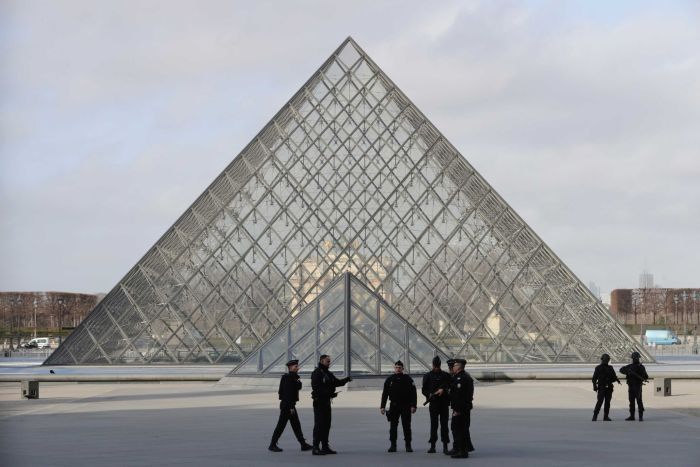Louvre museum: French soldiers shoot knife-wielding man, thwart suspected terror attack
Updated
An Egyptian national visiting France on a tourist visa has attacked soldiers at the Louvre Museum in Paris with a machete, in what officials are describing as a suspected terror attack.
Key points:
- The suspected attacker is a 29-year-old Egyptian national who was in France on a tourist visa
- He allegedly lunged at soldiers, with a machete in each hand, after they stopped him from entering the Louvre with two bags
- Suspect is hospitalised with gunshot wound to the abdomen
French soldiers neutralised the threat when they opened fire on and wounded the man, who they had stopped when he tried to enter the Louvre carrying two bags.
The attacker launched himself at the soldiers when they told him that he could not take his bags into the Carrousel du Louvre shopping mall underneath the world-famous museum.
Police inquiries established that the man, who was hospitalised after being shot in the abdomen, was a 29-year-old Egyptian who arrived in France on January 26 after obtaining a tourist visa in Dubai, Paris prosectutor Francois Molins said.
Security sources in Cairo identified the man as Abdullah Reda al-Hamamy, who was born in Dakahlia, a province north-east of Cairo.
Analysis from James Glenday:
In November, Parisians wept as plaques to the 130 people murdered by Islamist extremists in 2015 were unveiled across the city.But amid the grief there was hope.
Hope that one year on from the Paris terrorist attacks things were returning to normal and hope too that such a brutal massacre could never be repeated.
And now there is this.
Some will see the Louvre attack as a triumph for French security forces — a man shot and arrested before any serious harm was done.
But others will despair and question whether anything can be done to stop deranged "lone wolves" carrying out more disturbing attacks.
This is also undoubtedly another blow to Paris's prized, yet battered, tourism industry.
After the Eiffel Tower, the Louvre is pretty close to the city's second most popular attraction, and even before this incident foreign visitor numbers had dropped by 20 per cent.
Many would-be travellers will now be asking themselves: "Is the city really safe?"
James Glenday is one of the ABC's Europe correspondents.
The man was wearing a black T-shirt with a death's head emblem when he attacked soldiers checking bags near the museum's shopping mall "with a machete in each hand", Mr Molins said.
He struck one soldier and knocked another one to the ground. When he continued his attacks the soldier on the ground shot him in the abdomen, Mr Molins said.
The head of the French capital's police force, Michel Cadot, said the man cried out "Allahu Akbar" while brandishing the weapon.
Spraypaint cans — but no explosives — were found in his backpack, a source close to the investigation told Reuters.
Police have searched an apartment the man had rented in Paris and are now working to establish whether he acted alone, on impulse, or on orders from someone, Mr Molins said.
Visitors learned of attack over loudspeaker
The Louvre Museum — where the Mona Lisa hangs — went into emergency lockdown following the attack, with authorities closing the museum and keeping visitors inside from leaving.
Police said the area had been evacuated and they cordoned off access to the museum.
Visitors to the Louvre reportedly learned of the attempted attack by loudspeaker, but there was no panic, witnesses said.
But some children cried as guards directed people to sit tight together and away from windows.
"[The announcement] came over the loudspeakers that are dotted around," said Paul Lecher, 68, a retired Parisian and frequent Louvre visitor.
"Everything happened calmly. It was just a case of listening ... people quickly understood, even those who didn't understand a word of French, that something unusual was happening."
President Francois Hollande praised the soldiers' "courage and determination".
Heavily armed soldiers have been on the streets of Paris since the terrorist attacks on the city in November 2015.
The most recent deadly attack took place in the southern city of Nice when a man drove a truck into a crowd celebrating Bastille Day, killing 86.
In September, in an attempted attack, a group of women parked a car containing gas canisters near Paris' Notre Dame Cathedral.
 Photo:
French police have cordoned off and evacuated the area around the Louvre museum. (Reuters: Christian Hartmann)
Photo:
French police have cordoned off and evacuated the area around the Louvre museum. (Reuters: Christian Hartmann)
ABC/wires
Topics: unrest-conflict-and-war, defence-and-national-security, france
First posted








